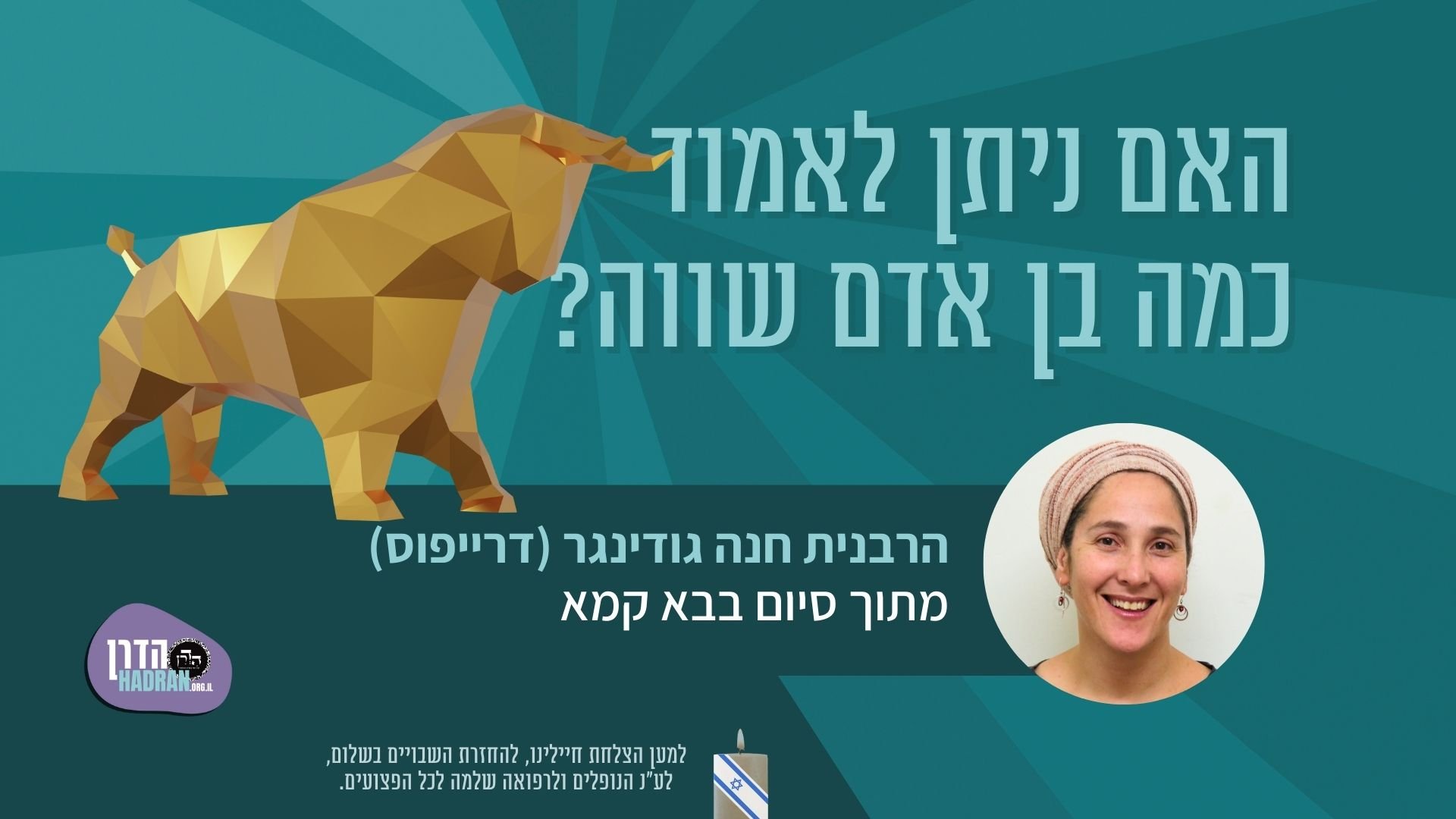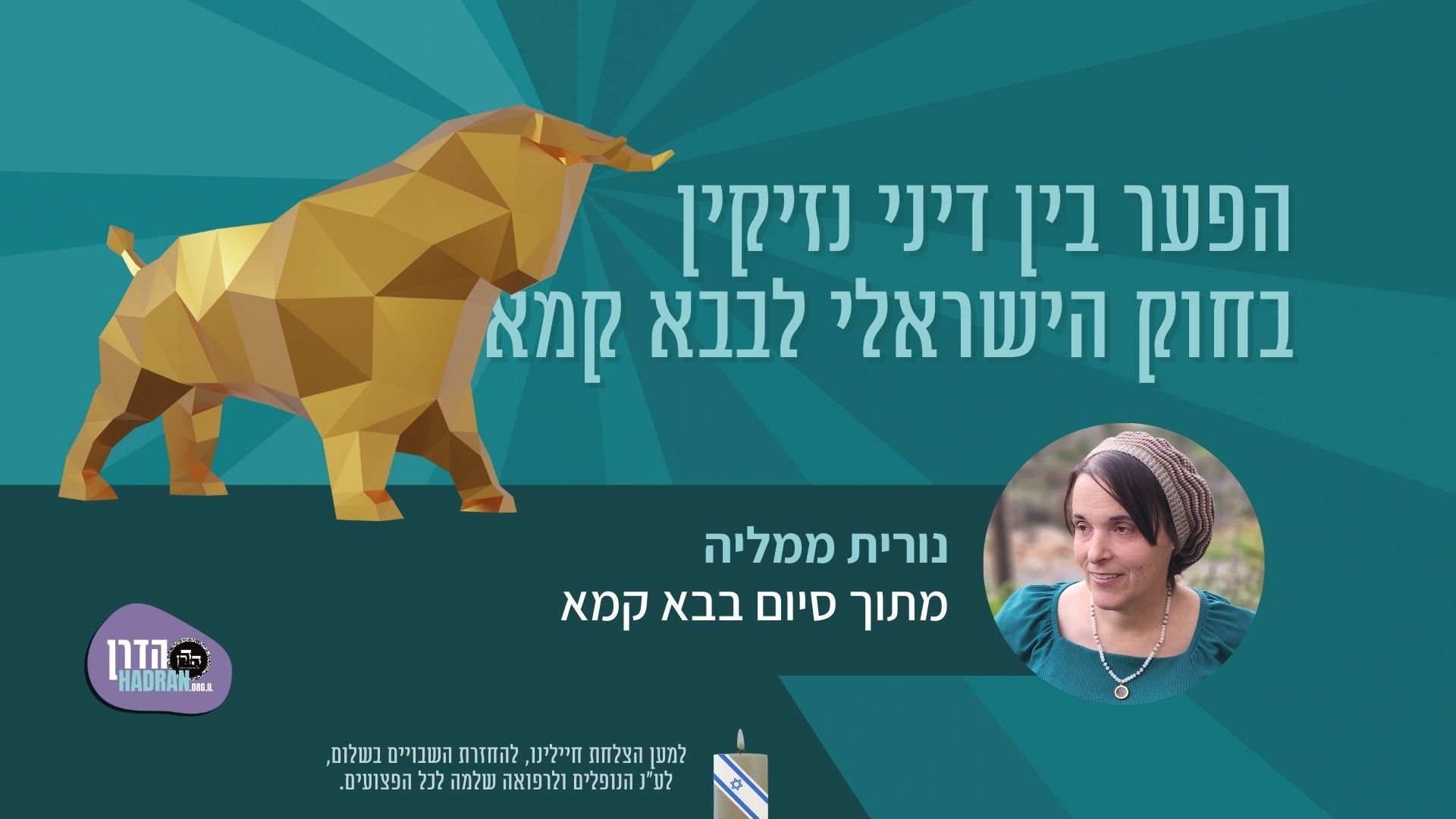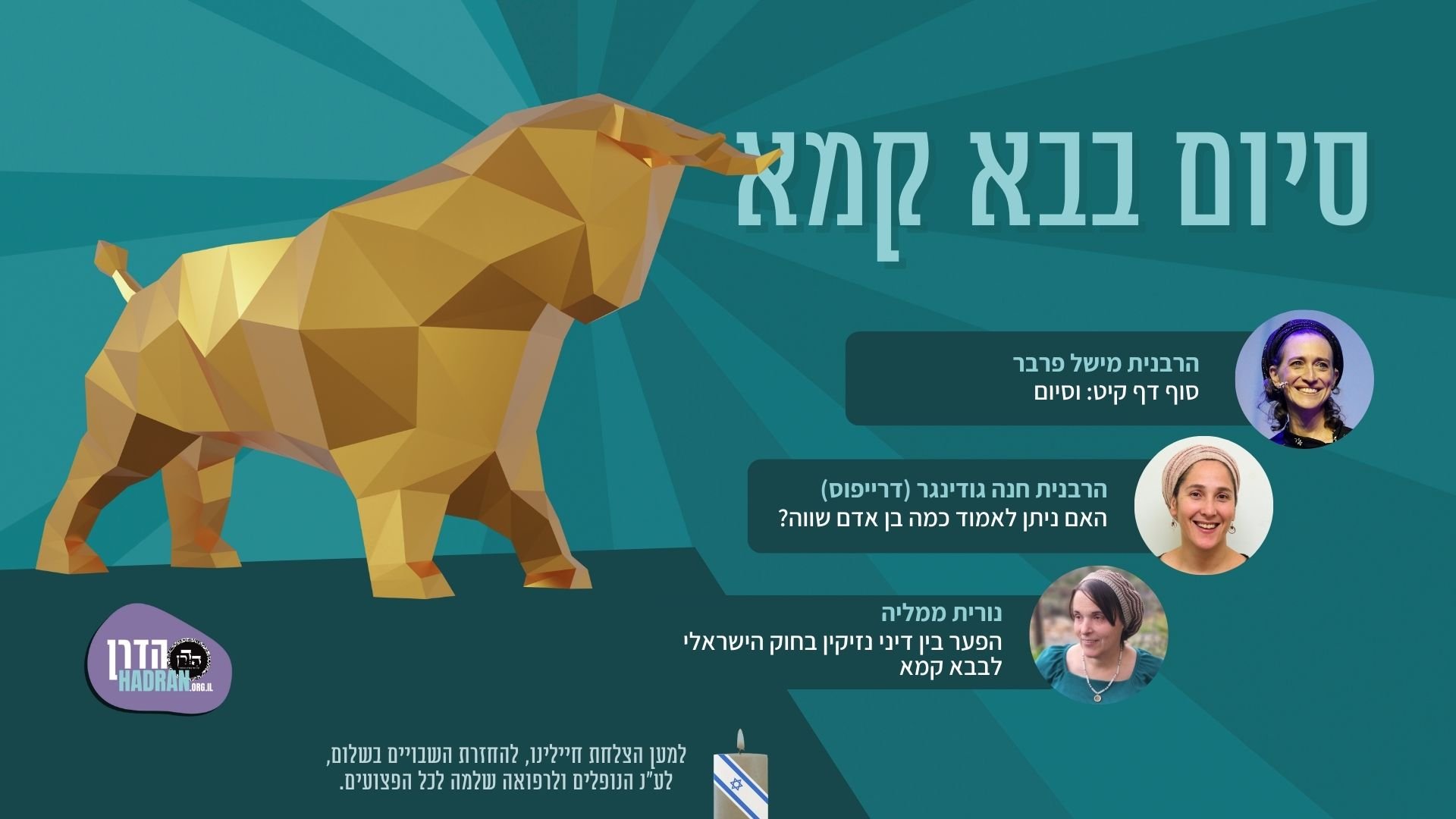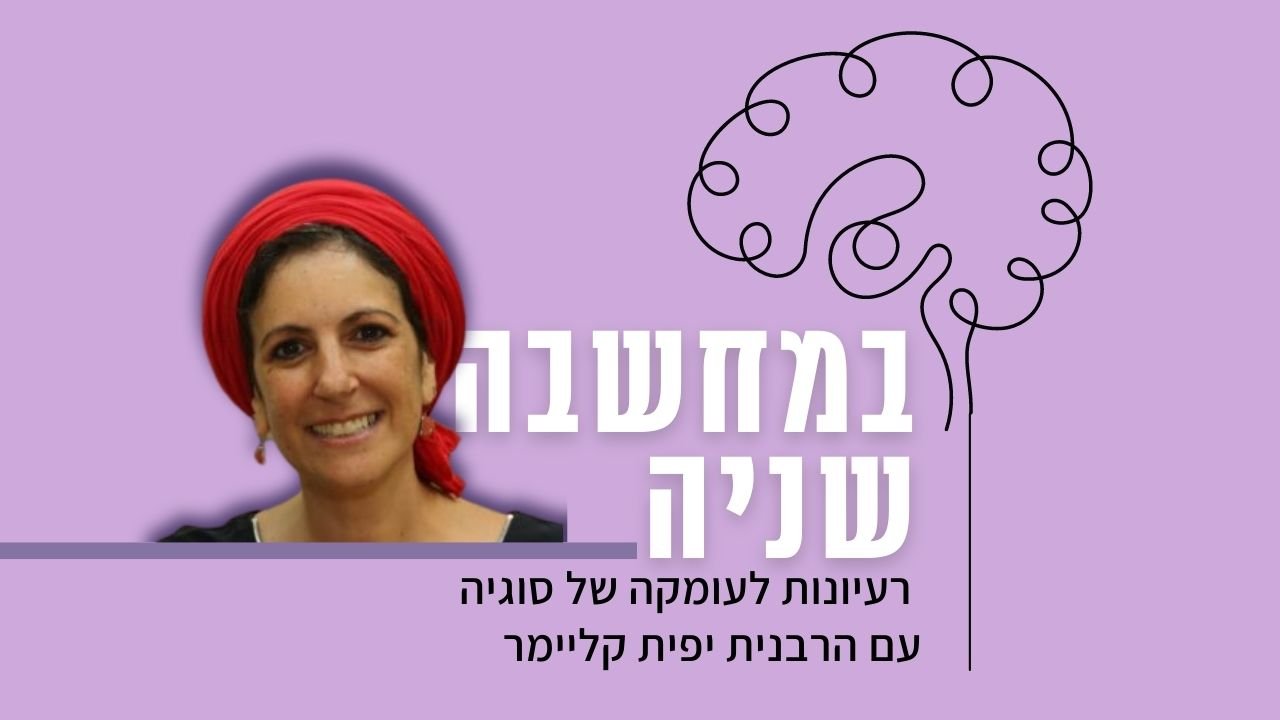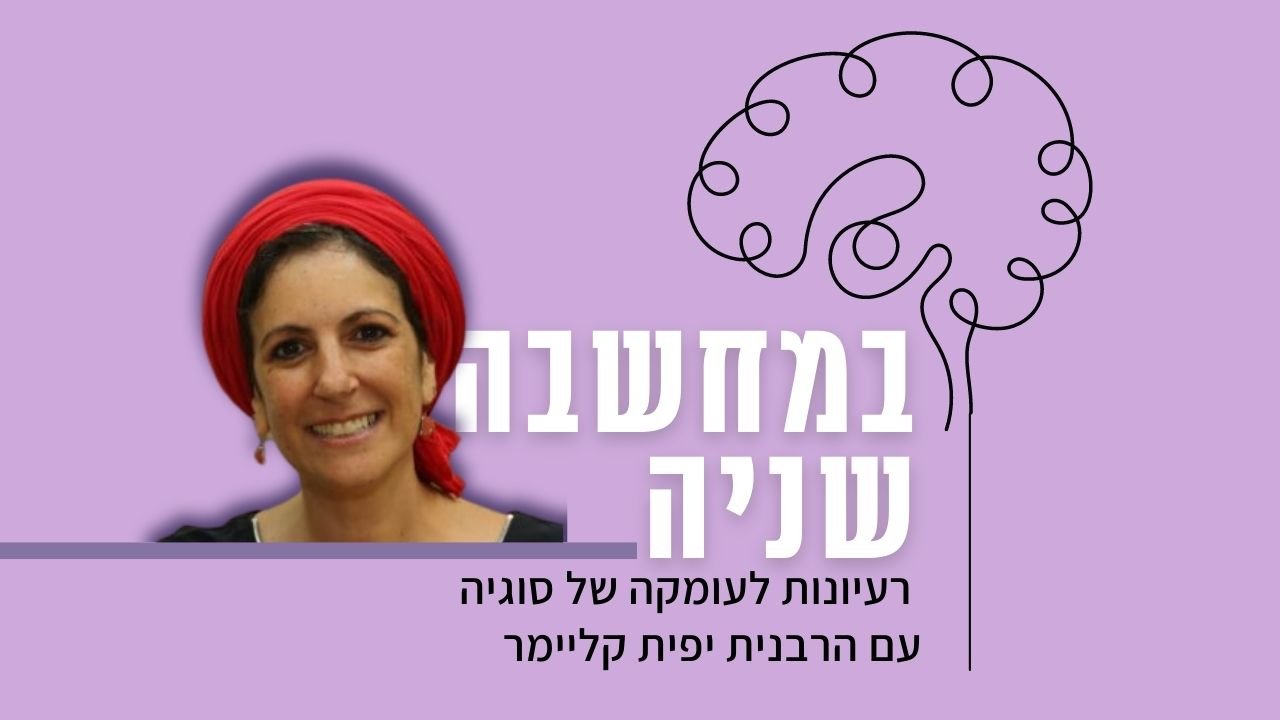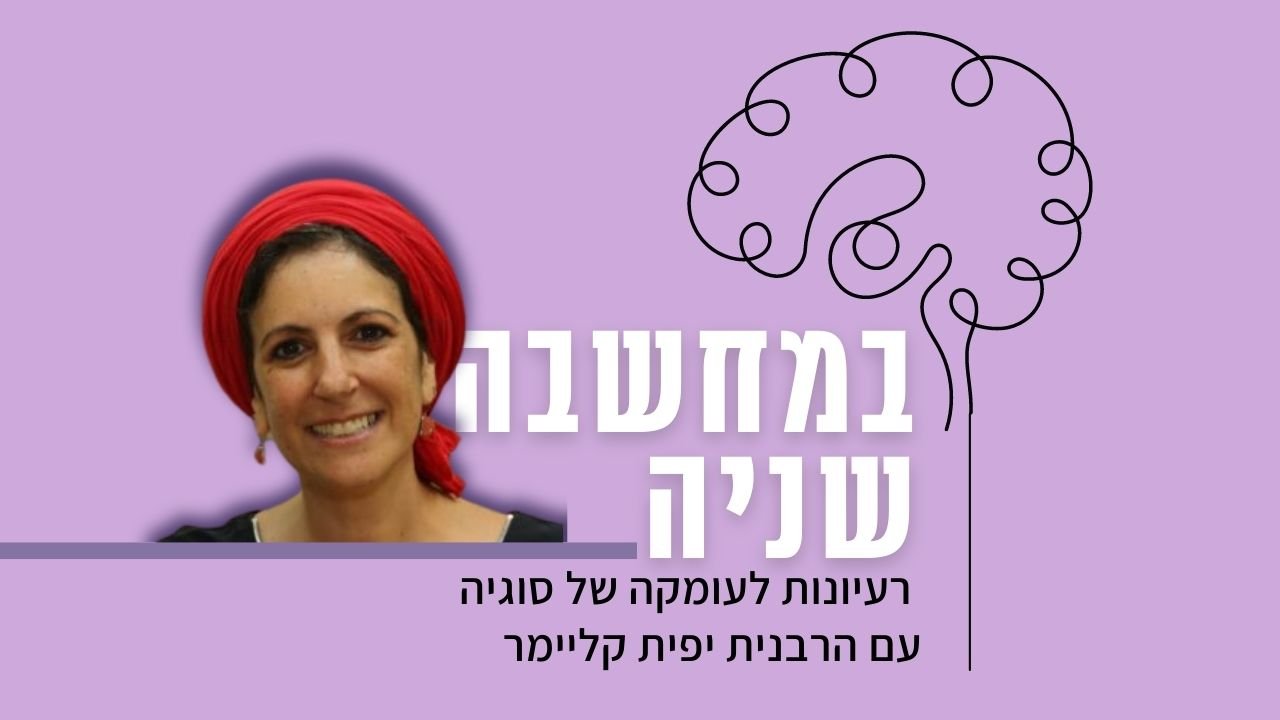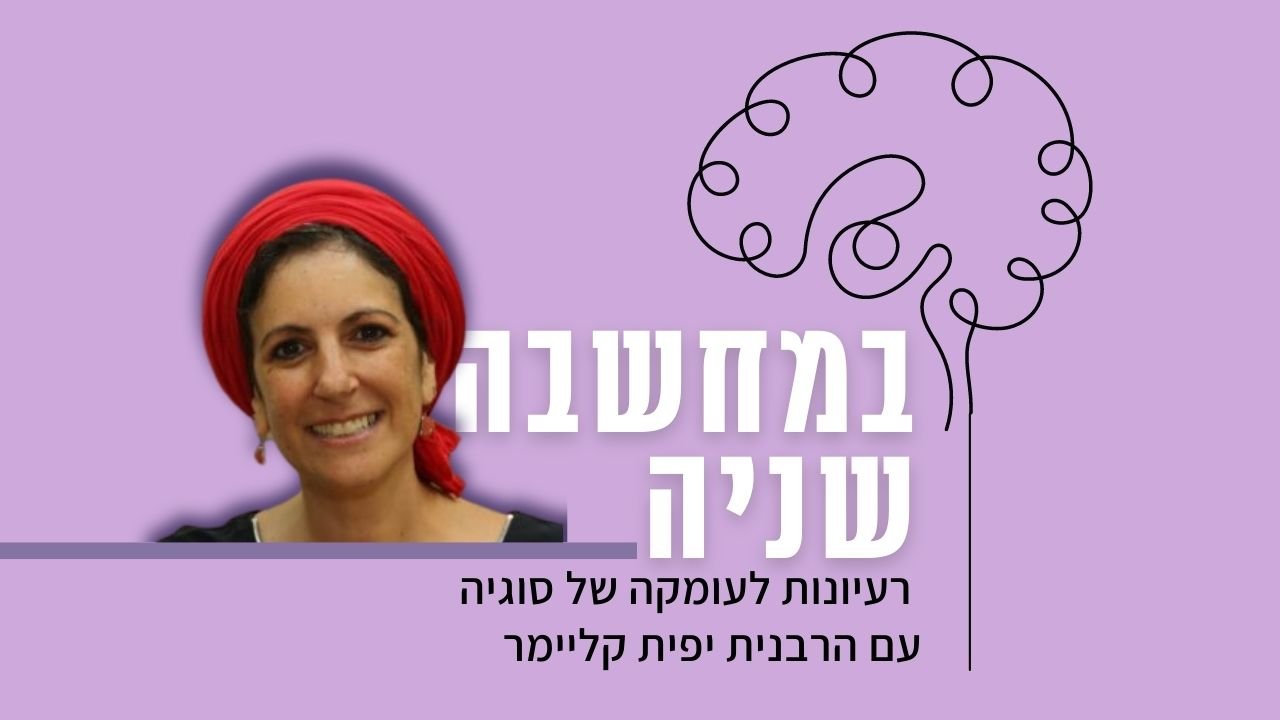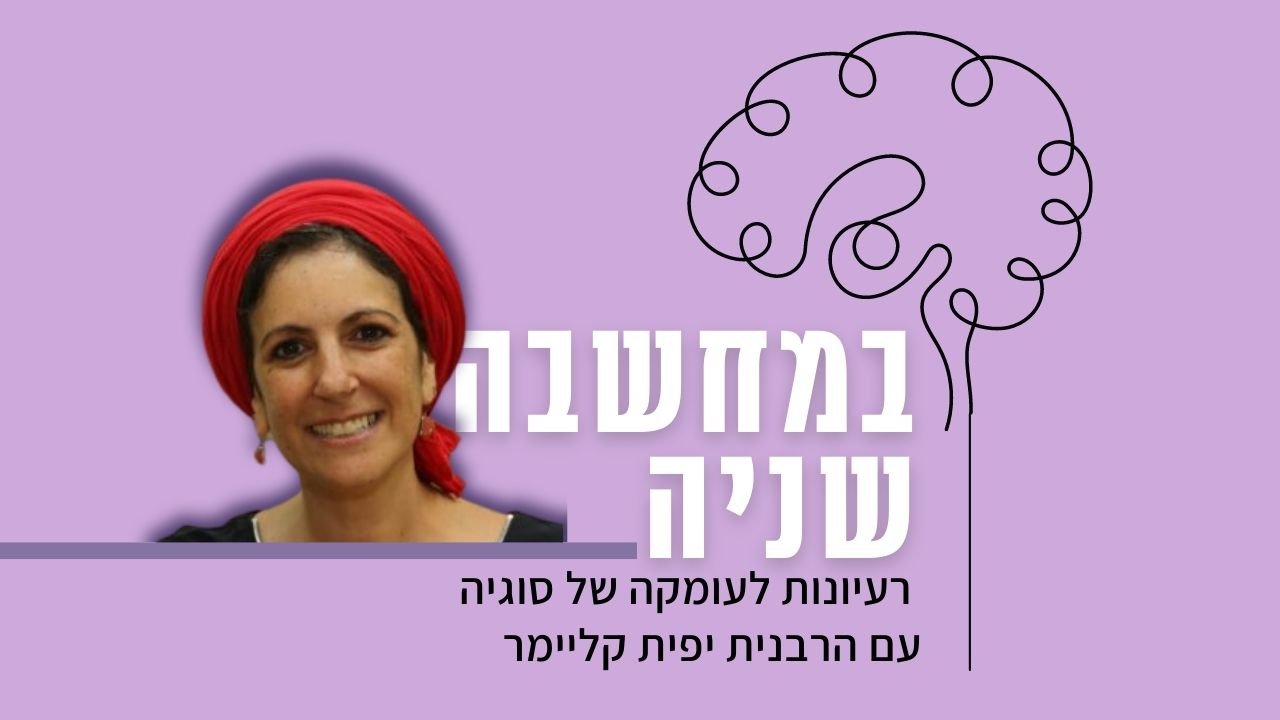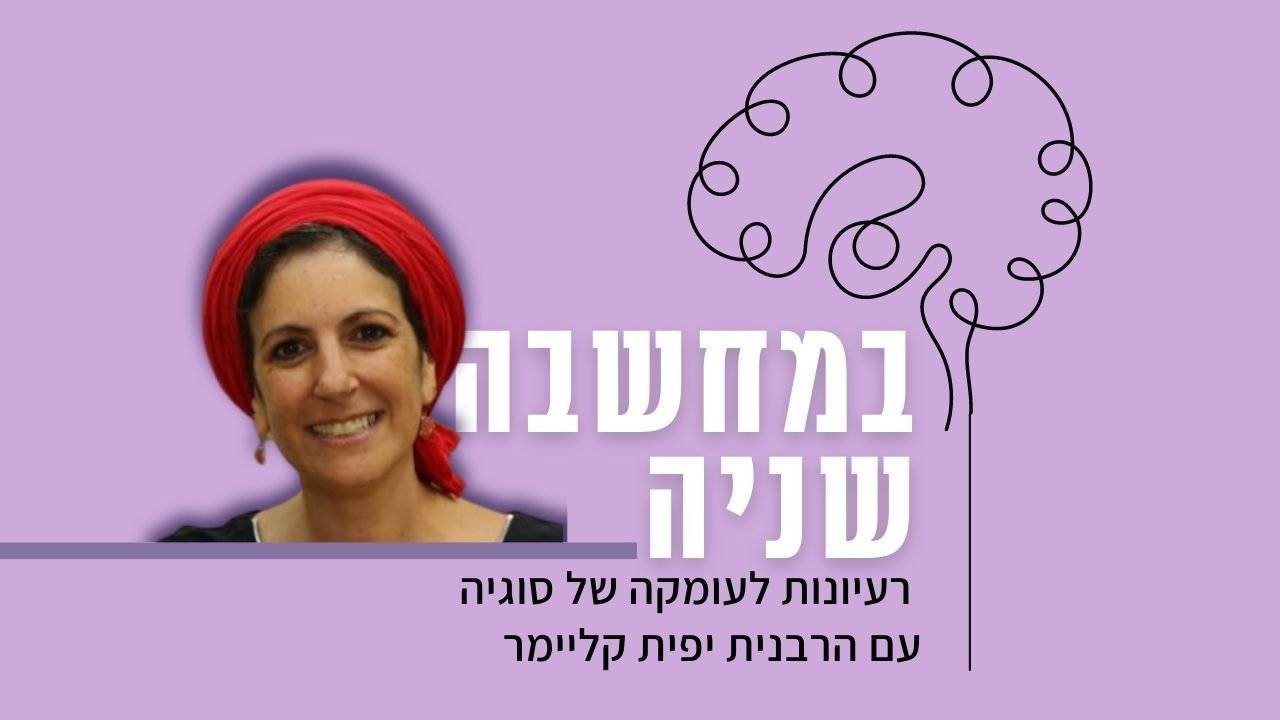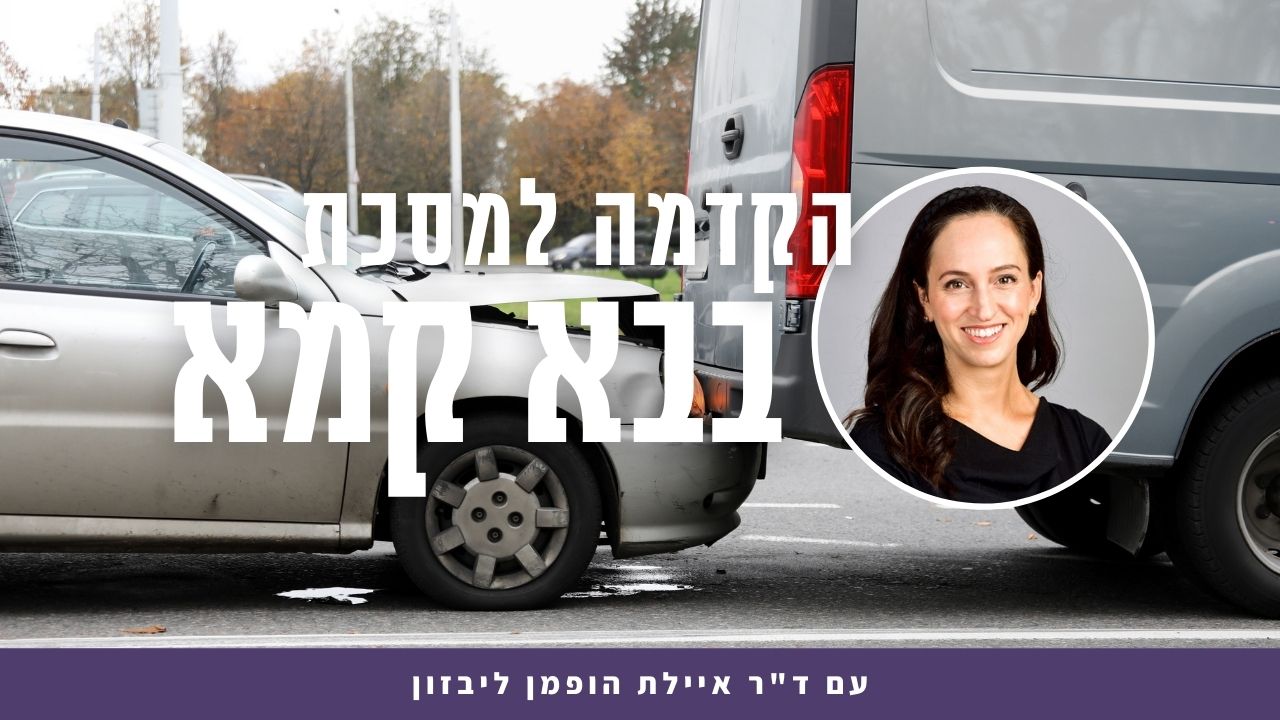בבא קמא צא
אַלְמָא בָּעֵינַן אוּמְדָּנָא דְּבֵי דִינָא; וְהָא, כֵּיוָן דִּגְמַר דִּינֵיהּ לִקְטָלָא – לָא מְשַׁהֵינַן לֵיהּ לְאוּמְדָּנָא דְּבֵי דִינָא, וְלָא מְעַנֵּינַן לְדִינֵיהּ.
Rava continues the report in their name: Apparently, we require the evaluation of the court in order to render him liable to pay for the damage. And with regard to this ox that killed, once the verdict was given that it to be put to death, we do not delay the implementation of the verdict in order to wait for the evaluation of the court, and we do not delay its judgment. Therefore, the monetary case is not judged.
וְאָמֵינָא לְהוּ אֲנָא: אֲפִילּוּ תֵּימָא רַבִּי עֲקִיבָא, הָכָא בְּמַאי עָסְקִינַן – כְּגוֹן שֶׁבָּרַח.
And I, Rava, said to the Sages of the school of Rav: Even if you say that this halakha is in accordance with the opinion of Rabbi Akiva, who does not require assessment by the court, one could explain that here we are dealing with a case where the owner of the ox fled, and the court cannot judge his case in his absence and cannot render him liable to pay for the damage caused by his ox.
אִי בָּרַח, כִּי לֹא דָּנוּהוּ דִּינֵי נְפָשׁוֹת – הֵיכִי דָּיְינִינַן לֵיהּ דִּינֵי מָמוֹנוֹת בְּלֹא בְּעָלִים? דְּקַבֵּיל סָהֲדִי וּבָרַח.
The Gemara asks: If the baraita is discussing a case where the owner fled, then in the case where they did not yet judge it as a case of capital law, how does the court judge it as a case of monetary law without the owner of the ox being present? The Gemara answers: The baraita is discussing a case where the court accepted the testimony of the witnesses in the presence of the owner, and he subsequently fled.
סוֹף סוֹף, מֵהֵיכָא מִשְׁתַּלַּם – מֵרִידְיָא; אִי הָכִי, תָּם – נְדַיְינֵיהּ דִּינֵי מָמוֹנוֹת בְּרֵישָׁא וְנִשְׁתַּלַּם מֵרִידְיָא, וַהֲדַר נְדַיְינֵיהּ דִּינֵי נְפָשׁוֹת!
The Gemara asks: Ultimately, from where are the damages paid in a situation where the owner fled, as he is not here to pay the damages? The Gemara answers: They are paid from plowing. The ox is rented out to plow fields, and the fees generated are used to pay the damages. Afterward, the ox is judged for the killing as a case of capital law. The Gemara asks: If so, with regard to an innocuous ox, why did the baraita rule that the court does not judge it as a case of monetary law? The court should judge it as a case of monetary law first, and the damages will be paid from fees generated from renting out the animal for plowing, and then the court should judge it as a case of capital law.
אָמַר רַב מָרִי בְּרֵיהּ דְּרַב כָּהֲנָא, זֹאת אוֹמֶרֶת: רִידְיָיא – עֲלִיָּיה דְּמָרֵהּ הוּא.
Rav Mari, son of Rav Kahana, said in answer to this last question: That is to say that the money gained from plowing is considered like the superior-quality property of its owner. In other words, that money is like the rest of the owner’s estate, and is not considered to be part of the value of the ox itself. Since payment for damage caused by an innocuous ox is taken only from the value of the ox itself, it follows that money received from renting out the ox to plow cannot be used to pay damages.
אִיבַּעְיָא לְהוּ: יֵשׁ אוֹמֶד לִנְזָקִין, אוֹ אֵין אוֹמֶד לִנְזָקִין?
§ In connection with the ruling of the baraita that the court must assess whether the death can be attributed directly to the action of the assailant, the Gemara notes: A dilemma was raised before the Sages: Is there an evaluation performed with regard to damage as well, to determine whether the act was sufficient to inflict that damage, or is there no evaluation performed with regard to damage?
מִי אָמְרִינַן: לִקְטָלָא הוּא דְּאָמְדִינַן – בְּהָכִי נָפְקָא נְשָׁמָה, בְּהָכִי לָא נָפְקָא נְשָׁמָה; אֲבָל לִנְזָקִין – כֹּל דְּהוּ; אוֹ דִלְמָא לָא שְׁנָא?
Do we say that specifically in a case of killing is where we perform an evaluation? The assessment is to determine whether a soul departs with this assault and the assailant will be held liable or whether a soul doesn’t depart with this assault and the death is attributed to other factors. But in a case of damage, perhaps we say that he is liable for whatever caused the damage. Or perhaps there is no difference between the two, and with regard to damage as well, the court evaluates whether the act was sufficient to inflict that damage, and if it was not, he will be exempt.
תָּא שְׁמַע: מָה בּוֹר – שֶׁיֵּשׁ בּוֹ כְּדֵי לְהָמִית, עֲשָׂרָה טְפָחִים; אַף כֹּל שֶׁיֵּשׁ בּוֹ כְּדֵי לְהָמִית, עֲשָׂרָה טְפָחִים. הָיוּ פְּחוּתִין מֵעֲשָׂרָה טְפָחִים, וְנָפַל לְתוֹכוֹ שׁוֹר אוֹ חֲמוֹר וָמֵת – פָּטוּר. הוּזַּק בּוֹ – חַיָּיב.
The Gemara says: Come and hear a proof from what was taught in a mishna (50b) concerning the halakhot of a pit: Just as a pit that has sufficient depth to cause death when falling into it is at least ten handbreadths deep, so too, any other excavations that have sufficient depth to cause death may be no less than ten handbreadths. If any of the types of excavations were less than ten handbreadths deep, and an ox or a donkey fell into one of them and died, the digger of the excavation is exempt. But if it was injured in it but did not die he is liable to pay damages.
מַאי, לָאו מִמַּטָּה לְמַעְלָה קָא חָשֵׁיב – וְהָכִי קָאָמַר: מִטֶּפַח וְעַד עֲשָׂרָה – מִיתָה לֵיכָּא, נְזָקִין אִיכָּא? אַלְמָא לִנְזָקִין – כֹּל דְּהוּ, שְׁמַע מִינַּהּ אֵין אוֹמְדִין לִנְזָקִין!
What, is it not the case that the mishna is counting the handbreadths from below to above, and this is what it is saying: From one handbreadth deep until ten handbreadths deep, there is no liability for death but there is liability for damage? Apparently, with regard to damage he is liable for whatever caused the damage, even a fall into an excavation having the depth of one handbreadth. Learn from the mishna that the court does not perform an evaluation with regard to damage.
לֹא, מִמַּעְלָה לְמַטָּה קָא חָשֵׁיב; וְהָכִי קָאָמַר: עֲשָׂרָה – מִיתָה אִיכָּא; פָּחוֹת מֵעֲשָׂרָה פּוּרְתָּא – נְזָקִין אִיתָא, מִיתָה לֵיכָּא. וּלְעוֹלָם אֵימָא לָךְ יֵשׁ אוֹמֶד לִנְזָקִין, וְכֹל מִידֵּי וּמִידֵּי – כִּי הֵיכִי דְּמִיתַּזְקָה בֵּיהּ בָּעֵינַן.
The Gemara rejects this: No, the mishna is counting from above to below, and this is what it is saying: If the excavation is ten handbreadths deep then there is liability for death. If the excavation is slightly less than ten, there is liability for damage but there is no liability for death. And actually, I will say to you that there is an evaluation performed for damage, and for each and every circumstance, we require that there be conditions whereby the injured party could reasonably be damaged by whatever caused the damage.
תָּא שְׁמַע: הִכָּהוּ עַל עֵינוֹ וְסִימְּאוֹ, עַל אׇזְנוֹ וְחֵירְשׁוֹ – עֶבֶד יוֹצֵא בָּהֶן לְחֵירוּת. כְּנֶגֶד עֵינוֹ – וְאֵינוֹ רוֹאֶה, כְּנֶגֶד אׇזְנוֹ – וְאֵינוֹ שׁוֹמֵעַ, אֵין עֶבֶד יוֹצֵא בָּהֶן לְחֵירוּת. מַאי טַעְמָא? לָאו מִשּׁוּם דְּבָעֵינַן אוּמְדָּנָא – וּשְׁמַע מִינַּה:ּ יֵשׁ אוּמְדָּנָא לִנְזָקִין?
The Gemara suggests another proof: Come and hear a proof from what was taught in a baraita (Tosefta 9:26): If a slave owner struck his Canaanite slave on his eye and blinded him, or on his ear and deafened him, the slave is emancipated by means of these wounds. If he struck near his eye and as a result he does not see, or near his ear and he does not hear, the slave is not emancipated by means of these wounds. What is the reason that the slave is not emancipated? Isn’t it due to the fact that we require an evaluation of the damage, and in such a case the assumption is that the owner’s action did not suffice to cause the injury? And learn from the baraita that there is an evaluation performed with regard to damage.
לָא; מִשּׁוּם דְּאָמְרִינַן: הוּא דְּאַבְעֵית נַפְשֵׁיהּ. כִּדְתַנְיָא: הַמַּבְעִית אֶת חֲבֵירוֹ – פָּטוּר מִדִּינֵי אָדָם, וְחַיָּיב בְּדִינֵי שָׁמַיִם. כֵּיצַד? תָּקַע בְּאׇזְנוֹ וְחֵירְשׁוֹ – פָּטוּר, אֲחָזוֹ וְתָקַע בְּאׇזְנוֹ וְחֵירְשׁוֹ – חַיָּיב.
The Gemara rejects this: No; the slave is not emancipated, because we say that it is possible that it was the slave who frightened himself, resulting in his blindness or deafness, but it was not the actual strike that caused it. An injury can result from being frightened, as it is taught in a baraita (Tosefta 6:16): One who frightens another and thereby causes him injury is exempt according to human laws but liable according to the laws of Heaven. How so? If one shouted into another’s ear and deafened him, he is exempt according to human laws but liable according to the laws of Heaven. But if he held him and shouted into his ear and deafened him, he is liable according to human laws as well, as he physically took hold of him.
תָּא שְׁמַע: חֲמִשָּׁה דְּבָרִים אוֹמְדִין אוֹתוֹ, וְנוֹתְנִין לוֹ מִיָּד. רִיפּוּי וָשֶׁבֶת – עַד שֶׁיִּתְרַפֵּא. אֲמָדוּהוּ, וְהָיָה מִתְנַוְנֶה וְהוֹלֵךְ – אֵין נוֹתְנִין לוֹ אֶלָּא כְּמוֹ שֶׁאֲמָדוּהוּ.
The Gemara suggests another proof: Come and hear a proof from what was taught in a baraita (Tosefta 9:3): With regard to the five types of indemnity that one who injures another must pay, the court evaluates the victim as to the value of the damage that he suffered, and the assailant gives this payment to him immediately. Payment for medical costs and loss of livelihood is evaluated from the moment of injury until he is healed. If the court evaluated that a certain sum would be needed to pay for his medical costs and loss of livelihood, and subsequently the victim’s condition began progressively deteriorating and the sum proved to be inadequate, they give him payment only as they had evaluated him.
אֲמָדוּהוּ וְהִבְרִיא – נוֹתְנִין לוֹ כׇּל מַה שֶּׁאֲמָדוּהוּ. שְׁמַע מִינַּהּ: יֵשׁ אוֹמֶד לִנְזָקִין! לְמֵימַד גַּבְרָא, כַּמָּה לִיקְּצַר מֵיהָא מַכָּה כַּמָּה לָא מִקְּצַר – לָא קָא מִבְּעֵי לַן, דְּוַדַּאי אָמְדִינַן. כִּי קָא מִבַּעְיָא לַן – לְמֵימַד חֶפְצָא, אִי עָבֵיד הַאי נִזְקָא אוֹ לָא. מַאי?
The baraita continues: If they evaluated him as requiring a certain sum for medical costs and loss of livelihood and he healed sooner than expected, they nevertheless give him the entire sum as they had evaluated him. Learn from the baraita that there is an evaluation performed with regard to damage. The Gemara clarifies: With regard to evaluating an injured man to determine how long he will suffer from this injury and how long he will not suffer, we do not raise a dilemma, since it is obvious that we certainly evaluate this element. When we raise the dilemma of whether the court performs an evaluation or not, it is with regard to evaluating an item, i.e., determining if it is capable of causing this damage or if it is not capable of causing this damage. With regard to this issue, what is the halakha?
תָּא שְׁמַע, שִׁמְעוֹן הַתִּימְנִי אוֹמֵר: מָה אֶגְרוֹף מְיוּחָד – שֶׁמָּסוּר לָעֵדָה וְלָעֵדִים, אַף כֹּל מְיוּחָד שֶׁמָּסוּר לָעֵדָה וְלָעֵדִים. שְׁמַע מִינַּהּ: יֵשׁ אוֹמֶד לִנְזָקִין! שְׁמַע מִינַּהּ.
The Gemara suggests: Come and hear a proof from what was taught in a baraita (Tosefta, Sanhedrin 12:3): Shimon HaTimni says: Just as a fist is unique in that it is submitted to the assembly of judges to assess its ability to injure and to the witnesses who attest that this was the fist used to strike, so too, a ruling can be issued in the case of any item that is submitted to the assembly of judges to identify its ability to injure and to the witnesses who attest that this was the item used to strike. Learn from the baraita that there is an evaluation performed with regard to damage. The Gemara affirms: Learn from the baraita that this is so.
אָמַר מָר: אֲמָדוּהוּ וְהִבְרִיא, נוֹתְנִין לוֹ כׇּל מַה שֶּׁאֲמָדוּהוּ. מְסַיַּיע לֵיהּ לְרָבָא – דְּאָמַר רָבָא: הַאי מַאן דַּאֲמָדוּהוּ לְכוּלֵּי יוֹמָא, וְאִיתְּפַח לְפַלְגָא דְיוֹמָא וְקָא עָבֵיד עֲבִידְתָּא – יָהֲבִינַן לֵיהּ. דְּכוּלֵּי יוֹמָא מִן שְׁמַיָּא הוּא (דְּרַחֲמֵי) [דְּרַחִימוּ] עֲלֵיהּ.
The Master said above: If they evaluated him as requiring a certain sum for medical costs and loss of livelihood and he healed sooner than expected, they nevertheless give him the entire sum as they had evaluated him. This supports the opinion of Rava, as Rava said: With regard to this man whom they evaluated, concluding that he would not be able to perform labor for the entire day, and his wounds healed [ve’itpaḥ] at midday and he was performing labor, we give him compensation for the entire day. The injury was one that would generally cause a man to not be able to perform labor for an entire day, and it was from Heaven that they had compassion on him and healed him sooner. This does not affect the liability of the one who caused the damage.
רָקַק – וְהִגִּיעַ בּוֹ הָרוֹק, וְהֶעֱבִיר כּוּ׳. אָמַר רַב פָּפָּא: לֹא שָׁנוּ אֶלָּא בּוֹ, אֲבָל בְּבִגְדוֹ – לָא. וְנִיהְוֵי כִּי בִיֵּישׁ בִּדְבָרִים!
§ The mishna teaches (90a): If he spat at him and his spittle reached him, or if he removed another’s cloak, he must give the injured party four hundred dinars. Rav Pappa says: They taught this halakha only in a case where the spittle reached him. But if the spittle landed on his clothing without touching him, he is not required to pay him. The Gemara asks: Why not? Let it be like one who humiliated another with words.
אָמְרִי בְּמַעְרְבָא מִשְּׁמֵיהּ דְּרַבִּי יוֹסֵי בַּר אָבִין, זֹאת אוֹמֶרֶת: בִּיְּישׁוֹ בִּדְבָרִים – פָּטוּר מִכְּלוּם.
The Gemara answers: In the West, Eretz Yisrael, they say in the name of Rabbi Yosei bar Avin: That is to say that if he humiliated another with words alone, he is exempt from paying anything, although he will be held accountable by Heaven for his sin.
הַכֹּל לְפִי כְבוֹדוֹ [וְכוּ׳]. אִיבַּעְיָא לְהוּ: תַּנָּא קַמָּא לְקוּלָּא קָאָמַר, אוֹ לְחוּמְרָא קָאָמַר? לְקוּלָּא קָאָמַר – דְּאִיכָּא עָנִי דְּלָא בָּעֵי לְמִשְׁקַל כּוּלֵּי הַאי, אוֹ דִלְמָא לְחוּמְרָא קָאָמַר – דְּאִיכָּא עָשִׁיר דְּבָעֵי לְמִיתַּב לֵיהּ טְפֵי?
The mishna teaches with regard to the assessment of payment for humiliation: It is all assessed in accordance with the honor of the one who was humiliated. A dilemma was raised before the Sages: Does the first tanna in the mishna say his opinion as a leniency, or does he say his opinion as a stringency? The Gemara explains the two possibilities: He says his opinion as a leniency, teaching that there is a poor person, who doesn’t need to take so much payment for humiliation, as detailed in the fixed sums of the mishna. Or perhaps he says his opinion as a stringency, teaching that there is a rich person whom the assailant needs to give him more than those fixed sums.
תָּא שְׁמַע, מִדְּקָאָמַר רַבִּי עֲקִיבָא: אֲפִילּוּ עֲנִיִּים שֶׁבְּיִשְׂרָאֵל – רוֹאִין אוֹתָן כְּאִילּוּ הֵן בְּנֵי חוֹרִין שֶׁיָּרְדוּ מִנִּכְסֵיהֶם, שֶׁהֵם בְּנֵי אַבְרָהָם יִצְחָק וְיַעֲקֹב; שְׁמַע מִינַּהּ, תַּנָּא קַמָּא לְקוּלָּא קָאָמַר! שְׁמַע מִינַּהּ.
The Gemara suggests: Come and hear a proof from that which Rabbi Akiva says in the mishna: Even with regard to the poor of the Jewish people, they are viewed as though they were freemen who lost their property and were impoverished, and their humiliation is calculated according to this status, as they are the sons of Abraham, Isaac, and Jacob, and are all of prominent lineage. Conclude from Rabbi Akiva’s statement that the first tanna says his opinion as a leniency, meaning that while the first tanna states the principle that payment for humiliation is in accordance with the honor of the one who was humiliated, and therefore a poor person will receive less than the fixed sums listed in the mishna, Rabbi Akiva responds that even a poor man is deserving of those fixed sums by virtue of his esteemed lineage. The Gemara affirms: Conclude from the mishna that this is so.
וּמַעֲשֶׂה בְּאֶחָד שֶׁפָּרַע רֹאשׁ הָאִשָּׁה [וְכוּ׳]. וּמִי יָהֲבִינַן זְמַן? וְהָאָמַר רַבִּי חֲנִינָא: אֵין נוֹתְנִין זְמַן לַחֲבָלוֹת!
§ The mishna relates: And an incident occurred involving one who uncovered the head of a woman in the marketplace. The woman came before Rabbi Akiva to request that he assess payment for the humiliation that she suffered, and Rabbi Akiva obligated the assailant to give her four hundred dinars. The man said to Rabbi Akiva: My teacher, give me time to pay the penalty, and Rabbi Akiva gave him time. The Gemara asks: But do we give time for an assailant to pay compensation? But doesn’t Rabbi Ḥanina say: The court does not give one time to provide payment for injuries, and he must pay compensation immediately.
כִּי לָא יָהֲבִינַן לֵיהּ זְמַן – לַחֲבָלָה, דְּחַסְּרֵיהּ מָמוֹנָא; אֲבָל לְבוֹשֶׁת, דְּלָא חַסְּרֵיהּ מָמוֹנָא – יָהֲבִינַן.
The Gemara answers: When we do not give him time to pay compensation it is specifically with regard to injury, as he caused a monetary loss by inflicting physical damage on the victim. But with regard to humiliation, where he did not cause him a monetary loss, we do give him time to pay compensation.
שְׁמָרָהּ עוֹמֶדֶת עַל פֶּתַח חֲצֵירָהּ וְכוּ׳. וְהָתַנְיָא, אָמַר לוֹ רַבִּי עֲקִיבָא: צָלַלְתָּ בְּמַיִם אַדִּירִים וְהֶעֱלִיתָ חֶרֶס בְּיָדְךָ, אָדָם רַשַּׁאי לַחְבֹּל בְּעַצְמוֹ!
The mishna relates that the man then waited for her until she was standing by the opening of her courtyard, and caused her to uncover her own head. Rabbi Akiva said that although she caused injury to herself, which is not permitted, this does not negate the man’s requirement to pay her compensation. The Gemara asks: But isn’t it taught in a baraita that Rabbi Akiva said to him: You plunged into mighty waters and you raised nothing more than worthless earthenware in your hand, since it is permitted for a person to injure himself. This contradicts the mishna’s account of Rabbi Akiva’s opinion.
אָמַר רָבָא: לָא קַשְׁיָא; כָּאן בַּחֲבָלָה, כָּאן בְּבוֹשֶׁת. וְהָא מַתְנִיתִין בְּבוֹשֶׁת הוּא,
The Gemara answers: Rava said: It is not difficult. Here, in the mishna, where it states that one may not injure himself, it is stated with regard to inflicting actual physical injury, while there, in the baraita, where it states that it is permitted for one to injure himself, it is stated with regard to causing humiliation to oneself. The Gemara asks: But the ruling of Rabbi Akiva in the mishna is stated with regard to causing humiliation,
וְקָתָנֵי: הַחוֹבֵל בְּעַצְמוֹ, אַף עַל פִּי שֶׁאֵינוֹ רַשַּׁאי – פָּטוּר! הָכִי קָאָמַר לֵיהּ: לָא מִבַּעְיָא בּוֹשֶׁת, דְּאָדָם רַשַּׁאי לְבַיֵּישׁ אֶת עַצְמוֹ; אֶלָּא אֲפִילּוּ חֲבָלָה, דְּאֵין אָדָם רַשַּׁאי לְחַבֵּל בְּעַצְמוֹ – אֲחֵרִים שֶׁחָבְלוּ בּוֹ, חַיָּיבִין.
and it teaches: With regard to one who injures himself, although it is not permitted for him to do so, he is nevertheless exempt from any sort of penalty, indicating that the prohibition is in effect even with regard to humiliation. The Gemara answers: This is what Rabbi Akiva said to the man: It is not necessary to say with regard to humiliation, where it is permitted for a person to humiliate himself, that someone else who humiliated him is liable. But even with regard to injury, where it is not permitted for a person to injure himself, others who injured him are liable.
וְאֵין אָדָם רַשַּׁאי לְחַבֵּל בְּעַצְמוֹ? וְהָתַנְיָא: יָכוֹל נִשְׁבַּע לְהָרַע בְּעַצְמוֹ – וְלֹא הֵרַע, יְהֵא פָּטוּר? תַּלְמוּד לוֹמַר: ״לְהָרַע אוֹ לְהֵטִיב״ – מָה הֲטָבָה רְשׁוּת, אַף הֲרָעָה רְשׁוּת; אָבִיא נִשְׁבָּע לְהָרַע בְּעַצְמוֹ וְלֹא הֵרַע!
§ The Gemara discusses whether it is permitted to injure oneself. And is a person not permitted to injure himself? But isn’t it taught in a baraita: One might have thought that if one takes an oath to do evil to himself and did not do evil he will be exempt from bringing an offering for having transgressed this oath. Therefore, the verse states: “Or if anyone swear clearly with his lips to do evil or to do good” (Leviticus 5:4), which teaches that just as taking an oath to do good for which one is liable is referring to an optional activity, as opposed to taking an oath to perform a mitzva, so too, taking an oath to do evil is referring to an optional activity, as opposed to taking an oath to transgress. I can therefore include within the category of one who is liable if he transgressed his oath the person who takes an oath to do evil to himself and did not do evil. It is clear from this baraita that doing evil to oneself is permitted.
אָמַר שְׁמוּאֵל: בְּ״אֵשֵׁב בְּתַעֲנִית״.
The Gemara answers: Shmuel says: The ruling of the baraita is not referring to one who takes an oath to injure himself but is stated with regard to one who takes an oath stating: I will sit in observance of a fast, which it is permitted to do.
דִּכְווֹתַהּ גַּבֵּי הֲרָעַת אֲחֵרִים – לְהֹשִׁיבָם בְּתַעֲנִית; אֲחֵרִים מִי מוֹתֵיב לְהוּ בְּתַעֲנִיתָא?!
Earlier in this same baraita, it states that one who takes an oath to do evil to others is not liable for violating his oath if he does not do evil, as it is prohibited to do evil to others. If the baraita is referring to one who takes an oath to fast, then in the corresponding situation in the context of doing evil to others, the baraita must also then be referring to one who takes an oath to have others sit in observance of a fast. The Gemara asks: Can one compel others to sit in observance of a fast?
אִין; דִּמְהַדַּק לְהוּ בְּאִנְדְּרוֹנָא.
The Gemara answers: Yes; it is possible, as by preventing others from accessing food he can impose a fast on them, e.g., in a situation where he confined them in a room.
וְהָתַנְיָא: אֵיזֶהוּ הֲרָעַת אֲחֵרִים? ״אַכֶּה פְּלוֹנִי וְאֶפְצַע אֶת מוֹחוֹ״!
The Gemara questions the assertion that this is the case of the baraita: But isn’t it taught in a baraita: What is considered taking an oath to do evil to others? It is considered such if one takes an oath stating: I will strike so-and-so and I will injure his brain. Accordingly, in the corresponding situation of doing evil to oneself it is necessary to explain that the baraita is referring to causing injury as well, and the inference that this is permitted remains.
אֶלָּא תַּנָּאֵי הִיא; דְּאִיכָּא לְמַאן דְּאָמַר: אֵין אָדָם רַשַּׁאי לְחַבֵּל בְּעַצְמוֹ, וְאִיכָּא מַאן דְּאָמַר: אָדָם רַשַּׁאי לְחַבֵּל בְּעַצְמוֹ.
Rather, it must be that this is a dispute between tanna’im, as there is a tanna who says that it is not permitted for a person to injure himself, and there is a tanna who says that it is permitted for a person to injure himself.
מַאן תַּנָּא דְּשָׁמְעַתְּ לֵיהּ דְּאָמַר: אֵין אָדָם רַשַּׁאי לְחַבֵּל בְּעַצְמוֹ? אִילֵּימָא הַאי תַּנָּא הוּא – דְּתַנְיָא: ״וְאַךְ אֶת דִּמְכֶם לְנַפְשֹׁתֵיכֶם אֶדְרֹשׁ״ – רַבִּי אֶלְעָזָר אוֹמֵר: מִיַּד נַפְשׁוֹתֵיכֶם אֶדְרֹשׁ אֶת דִּמְכֶם;
The Gemara asks: Who is the tanna that you heard that says: It is not permitted for a person to injure himself? If we say that it is this tanna, as it is taught in a baraita: The verse states: “And surely your blood of your souls will I require” (Genesis 9:5), and Rabbi Elazar says: From the hand of your souls, i.e., from yourself, will I require your blood, meaning one is liable even for taking his own life, that is not a correct inference.
וְדִלְמָא קְטָלָא שָׁאנֵי!
But perhaps killing is different. While Rabbi Elazar holds that it is prohibited to take one’s own life, it cannot be inferred from here that he holds that one is liable for injuring himself.
אֶלָּא הַאי תַּנָּא הוּא – דְּתַנְיָא: מְקָרְעִין עַל הַמֵּת, וְלֹא מִדַּרְכֵי הָאֱמוֹרִי. אָמַר רַבִּי אֶלְעָזָר: שָׁמַעְתִּי שֶׁהַמְקָרֵעַ עַל הַמֵּת יוֹתֵר מִדַּאי – לוֹקֶה מִשּׁוּם ״בַּל תַּשְׁחִית״. וְכׇל שֶׁכֵּן גּוּפוֹ.
The Gemara suggests: Rather, it is the opinion of this tanna, as it is taught in a baraita: One may rend garments in anguish over one who died, and it is not considered of the ways of the Amorites, but a Jewish custom. Rabbi Elazar says: I heard that one who rends his garments excessively over one who died is flogged for having transgressed the prohibition of: Do not destroy (see Deuteronomy 20:19). The Gemara suggests: And all the more so it is the case that according to Rabbi Elazar one who injures his body in anguish transgresses this prohibition.
וְדִלְמָא בְּגָדִים שָׁאנֵי, דִּפְסֵידָא דְּלָא הָדַר הוּא! כִּי הָא דְּרַבִּי יוֹחָנָן קָרֵי [לְהוּ] לְמָאנֵי[הּ] ״מְכַבְּדוֹתַי״, וְרַב חִסְדָּא כַּד הֲוָה מְסַגֵּי בֵּינֵי הִיזְמֵי (וְהִגֵּא) [וְהִגֵּי] – מְדַלֵּי לְהוּ לְמָאנֵיהּ, אָמַר: זֶה מַעֲלֶה אֲרוּכָה, וְזֶה אֵינוֹ מַעֲלֶה אֲרוּכָה.
The Gemara rejects this suggestion: But perhaps garments are different, in that tearing them is a loss that is irreversible, like that practice of Rabbi Yoḥanan, who would refer to his garments as: My honor, and like that practice of Rav Ḥisda, who, when he would walk among thorns and shrubs, would raise his clothing despite the fact that his skin would get scratched by the thorns. He said in explanation of his actions: This flesh will heal if scratched, but that garment will not heal if torn. Similarly, perhaps it is prohibited to rend one’s garments, but it is permitted to injure oneself.
אֶלָּא הַאי תַּנָּא הוּא – דְּתַנְיָא: אָמַר רַבִּי אֶלְעָזָר הַקַּפָּר בְּרַבִּי, מָה תַּלְמוּד לוֹמַר: ״וְכִפֶּר עָלָיו מֵאֲשֶׁר חָטָא עַל הַנָּפֶשׁ״? וְכִי בְּאֵיזֶה נֶפֶשׁ חָטָא זֶה? אֶלָּא שֶׁצִּיעֵר עַצְמוֹ מִן הַיַּיִן. וַהֲלֹא דְּבָרִים קַל וְחוֹמֶר – וּמָה זֶה, שֶׁלֹּא צִיעֵר עַצְמוֹ אֶלָּא מִן הַיַּיִן, נִקְרָא חוֹטֵא; הַמְצַעֵר עַצְמוֹ מִכׇּל דָּבָר, עַל אַחַת כַּמָּה וְכַמָּה!
Rather, it is this tanna, as it is taught in a baraita: Rabbi Elazar HaKappar the Distinguished said: What is the meaning when the verse states with regard to a nazirite: “And he shall atone for him for sinning by the soul” (Numbers 6:11)? And with which soul did this person sin by becoming a nazirite? Rather, in that he afflicted himself by abstaining from wine he is considered to have sinned with his own soul, and he must bring a sin-offering for the naziriteship itself, for causing his body to suffer. And are these matters not inferred a fortiori: And just as this person who afflicted himself by abstaining only from wine is nevertheless called a sinner, one who afflicts himself by abstaining from everything, through fasting or other acts of mortification, all the more so is he described as a sinner? Consequently, Rabbi Elazar HaKappar holds that one may not harm himself in any manner.
הַקּוֹצֵץ נְטִיעוֹתָיו [וְכוּ׳]. תָּנֵי רַבָּה בַּר בַּר חַנָּה קַמֵּיהּ דְּרַב: ״שׁוֹרִי הָרַגְתָּ״, ״נְטִיעוֹתַי קָצַצְתָּ״; ״אַתָּה אָמַרְתָּ לִי לְהוֹרְגוֹ״, ״אַתָּה אָמְרַתְּ לִי לְקוֹצְצוֹ״ – פָּטוּר. אֲמַר לֵיהּ: אִם כֵּן, לָא שְׁבַקְתְּ חַיֵּי לְבִרְיָיתָא! כֹּל כְּמִינֵּיהּ?!
§ The mishna teaches: One who cuts down his own saplings, although it is not permitted for him to do so, is exempt from payment. Nevertheless, others who cut down his saplings are liable. Rabba bar bar Ḥana taught the following baraita before Rav: If one charged another: You killed my ox, or: You cut down my saplings, and you are liable to pay for them, and the other responds: You told me to kill the ox, or: You told me to cut down the saplings, he is exempt from paying. Rav said to him: If that is so, you let no creature exist. Is it in his power to assert that because the other instructed him to cause damage he is exempt? With this claim, anyone who causes damage can exempt himself.
אֲמַר לֵיהּ: אֶיסְמְיַיהּ? אֲמַר לֵיהּ: לָא; תִּתַּרְגַּם מַתְנִיתָךְ בְּשׁוֹר הָעוֹמֵד לַהֲרִיגָה, וּבְאִילָן הָעוֹמֵד לִקְצִיצָה.
Rabba bar bar Ḥana said to Rav: Shall I erase this baraita from the baraitot that I teach? Rav said to him: No, just interpret that your baraita is stated with regard to an ox that is ready to be killed, e.g., it had gored, and the owner decided to have it killed, and it is stated with regard to a tree that is ready to be cut down for whatever reason, e.g., it was worshipped as part of an idolatrous rite or it is situated in a manner that poses a danger to the public. In such a case there is reason to believe that he was in fact instructed to cut it down.
אִי הָכִי, מַאי קָא טָעֵין לֵיהּ? דְּאָמַר לֵיהּ: אֲנָא בָּעֵינָא לְמִיעְבַּד הָא מִצְוָה.
The Gemara asks: If that is so, that the owner of the ox or tree acknowledges that it would be killed or cut down in any event, what claim is he stating to him, as there was no loss resulting from the action of the other? The Gemara answers: The case is where he said to him: I desire to perform this mitzva of removing a danger or destroying idolatry by myself, and therefore I am demanding payment from you for having prevented me from doing so.
דְּתַנְיָא: ״וְשָׁפַךְ וְכִסָּה״ – מִי שֶׁשָּׁפַךְ, יְכַסֶּה. וּמַעֲשֶׂה בְּאֶחָד שֶׁשָּׁחַט, וְקָדַם חֲבֵירוֹ וְכִסָּה, וְחִיְּיבוֹ רַבָּן גַּמְלִיאֵל לִיתֵּן לוֹ עֲשָׂרָה זְהוּבִים.
This is as it is taught in a baraita: The verse states with regard to one who slaughters an undomesticated animal or a bird: “He shall pour out the blood thereof, and he shall cover it with dust” (Leviticus 17:13). This teaches that the one who poured the blood, i.e., the one who slaughtered, shall cover the blood. An incident occurred involving one who slaughtered an undomesticated animal or bird, and another preempted him and covered the blood, and Rabban Gamliel deemed him liable to give ten golden coins to the one who slaughtered the animal, as he prevented him from performing the mitzva.
אָמַר רַב: דִּיקְלָא דִּטְעַן קַבָּא – אָסוּר לְמִקְצְצֵיהּ.
§ In connection with the prohibition against cutting down trees the Gemara notes: Rav said with regard to a palm tree that still produces fruit in the amount of a kav, that it is prohibited to cut it down due to the prohibition of: “When you shall besiege a city…you shall not destroy the trees” (Deuteronomy 20:19).
מֵיתִיבִי: כַּמָּה יְהֵא בַּזַּיִת וְלֹא יִקְצְצֶ[נּ]וּ? רוֹבַע! שָׁאנֵי זֵיתִים, דַּחֲשִׁיבִי.
The Gemara raises an objection to the statement of Rav from what was taught in a mishna (Shevi’it 4:10): How much fruit must be on an olive tree so that one may not cut it down? A quarter–kav. Why did Rav say that it must produce a full kav? The Gemara answers: Olive trees are different, since they are significant. Therefore, even a quarter-kav is valuable.
אָמַר רַבִּי חֲנִינָא: לָא שְׁכֵיב שִׁיבְחַת בְּרִי, אֶלָּא דְּקַץ תְּאֵינְתָּא בְּלָא זִמְנַהּ. אָמַר רָבִינָא: וְאִם הָיָה מְעוּלֶּה בְּדָמִים, מוּתָּר.
Rabbi Ḥanina said: My son Shivḥat did not die for any reason other than that he cut down a fig tree before its time. Ravina says: But if the lumber was greater in monetary value than its fruits, it is permitted to chop it down, and this does not violate the prohibition against destroying a tree.
תַּנְיָא נָמֵי הָכִי: ״רַק עֵץ אֲשֶׁר תֵּדַע״ – זֶה אִילַן מַאֲכָל, ״כִּי לֹא עֵץ מַאֲכָל הוּא״ – זֶה אִילַן סְרָק.
This halakha is also taught in a baraita. The verse states: “Only the trees of which you know that they are not trees for food, them you may destroy and cut down” (Deuteronomy 20:20). “Only the trees of which you know”; this is referring to a tree that bears fruit used for food, and it is permitted to cut down this type of tree under certain circumstances. “That they are not trees for food”; this is referring to a barren tree.
וְכִי מֵאַחַר שֶׁסּוֹפֵ[נ]וּ לְרַבּוֹת כׇּל דָּבָר, מָה תַּלְמוּד לוֹמַר ״כִּי לֹא עֵץ מַאֲכָל״? לְהַקְדִּים סְרָק לְמַאֲכָל.
The Gemara asks: And since the baraita will ultimately include all types of trees, so that even a tree that produces fruit may be cut down, what, then, is the meaning when the verse states: “That they are not trees for food,” which indicates that it is permitted to cut down only a barren tree? The Gemara answers: It is to give precedence to cutting down a barren tree over a tree whose fruit is used for food.

